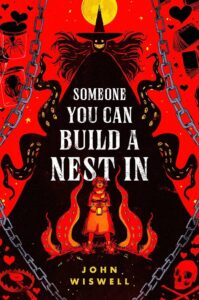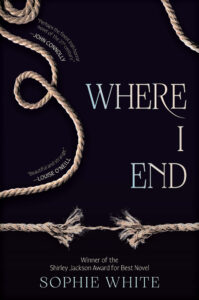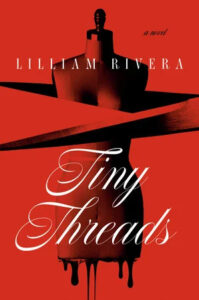Grotesque, discomforting, darkly humorous, and brilliant, these horror novels are the soundtrack in my mind allowing me to process reality’s growing discontents. Some of the following are notable for their direct confrontation with real-world darkness, while others serve as an antidote to demonization, a path towards self-love in a cruel world. All are gorgeously written, terrifyingly executed, and worthy of the old adage: art should disturb the comfortable, and comfort the disturbed.

Stephen Graham Jones, I Was a Teenage Slasher
(Saga)
With breakneck pacing and down-to-earth narration, I Was a Teenage Slasher is a tongue-in-cheek ode to the slasher’s heyday. Stephen Graham Jones’ shaggy dog of a story is set in the Texas panhandle circa 1989, where those few residents who haven’t left for the oilfields or the city are now at risk of becoming quickly deceased at the hands of Jones’ befuddled narrator, and his chainsaw wielding compatriots. If Tobe Hooper made a Denis Hopper film and Arlo Guthrie did the soundtrack, it might look something like this.

Layla Martinez, Woodworm
Translated by Sophie Hughes and Annie McDermott
(Two Lines Press)
This book is so creepy!!! In a visceral exploration of the absurdities of male control, a woman and her grandmother are trapped in a house of horrors, built by a husband who cursed his female relatives to be bound to the abode, only to be trapped there himself, along with numerous other spirits. It’s all pretty bearable if you don’t let the ghosts think you’re getting too vulnerable—just don’t look under the bed, and if something grabs your ankle, squash it ever so firmly. Grotesque brilliance, all the way through.

John Wiswell, Someone You Can Build a Nest In
(Daw Books)
This ace monster romance has Wyrm-ed its way into my dark heart! And poses an important question: how badly can your in-laws treat When monster hunters rudely awaken Shesheshen, a wyrm of amorphous and ever-changing appearance, and wound her grievously, she doesn’t expect to be nursed back to health by an unsuspecting human, Homily, or to fall in love with her savior. Shesheshen has always hoped to find a partner to lay her eggs in, a co-parent to sacrifice their body for the nourishment of their young, but she loves Homily too much to see her eaten. Will their love make it through the disappointment of Homily’s family and the cannibalistic needs of Shesheshen’s offspring? (I have to give my colleague Drew Broussard a quick shoutout for putting this one on my radar—Thanks, Drew!)

Chuck Tingle, Bury Your Gays
(Tor Nightfire)
Chuck Tingle may have made his name in steamy-yet-absurdist erotica, but Bury Your Gays, along with last year’s Camp Damascus, cements Tingle’s place as one of the best new novelists around, horror or otherwise. Showrunner Misha is giving a harsh directive from his studio overlords: either kill off his queer characters, or make them straight. When he refuses to do either, monstrous beings from Misha’s previous cinematic endeavors start confronting him in the flesh, and even worse: they’re threatening his loved ones. This is quite possibly the best spoof of Hollywood since Get Shorty.

Sophie White, Where I End
(Erewhon Books)
White’s novel was first published two years ago, to much acclaim and little readership, and given that I was one of the many who remained ignorant when it first graced the earth, I’m so happy this sneaky little masterpiece got another shot at messing up readers. But what is it about? Well, quite a lot, actually, but the bare bones description goes thusly: a young woman lives on a remote Irish island, where she and her grandmother reluctantly care for her comatose mother, known as the “bed-thing”. The island’s small population is convinced the family is cursed, but it isn’t until White’s Shirley-Jackson-esque narrator meets a visiting artist that she begins to understand the full wrong-ness of her short life.

Mikaella Clements and Onjuli Datta, Feast While You Can
(Grand Central)
In a small village, two women form an intense connection as one begins to hear messages from the town’s resident monster. There’s a lot of amazing lesbian horror being published these days, but this one might be my favorite yet, partly because the two authors are married to each other! Which lends extra credence to the badass love affair at the center of the novel. You’ll be rooting for this couple as they face innumerable challenges, including racism, homophobia, and the monster’s insatiable demands for human flesh, and emerge stronger than ever.

Lilliam Rivera, Tiny Threads
(Del Rey)
Lilliam Rivera cuts the fashion industry to shreds in this horror-filled take on late stage capitalism. At the novel’s start, Samara is just starting a new job for a legendary fashion house; she arrives optimistic but quickly becomes aware of the classism and racism underlying the business of couture. Tiny Threads takes us into the back rooms of fashion giants, showing us the stark differences between the haves and have-nots, but there’s more to unravel in this terrifying yarn. Okay, enough with the needlecraft puns.

Monika Kim, The Eyes are the Best Part
(Erewhon Books)
In this darkly funny psychological horror, a college student must protect her mother and her sister from her mother’s creepy new boyfriend. Like all the other men in their lives, he’s trying to reduce their humanness into stereotypes about doll-like, submissive Asian women, and Kim’s protagonist is certainly not going to let him get away with it. She’s also spending a lot of time having intense dreams about eating bright blue eyes, standing over her sleeping enemies and fantasizing their demise, and generally losing touch with reality in a way that pays plenty of dividends by the novel’s end.

C. J. Leede, American Rapture
(Tor)
Cheeky, obscene, and brilliant, CJ Leede’s American Rapture is a revelation. Leede’s sophomore effort lives up to the promise of her shocking debut, Maeve Fly, and then some. In American Rapture, Leede’s heroine is a good Catholic girl whose sheltered childhood comes to an abrupt end when a horrifying new plague begins spreading across the country—a plague of lust. As the tagline says, the end times are coming.

E. K. Sathue, Youthjuice
(Hell’s Hundred)
In the first release from Hell’s Hundred, the new horror imprint from Soho Press, E. K. Sathue’s main character earns all the press release’s comparisons to Patrick Bateman. Just a run-of-the-mill sociopath at first, the narrator soon gets sucked into the murderous enterprise of a wellness company with an incredibly suspicious number of missing former interns and a CEO who appears to bathe in blood.

















